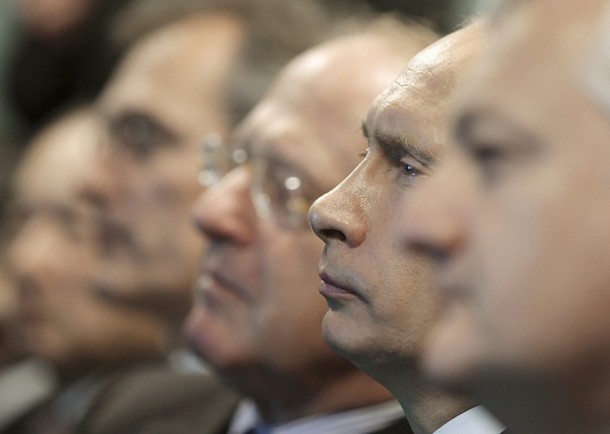
Putin Touts Vast Yamal Project for Global Export of LNG
Publication: Eurasia Daily Monitor Volume: 6 Issue: 176
By:

On September 24 the Russian Prime Minister Vladimir Putin led government ministers and CEO’s of some global energy companies on a visit to the Yamal Peninsula in northwestern Siberia. Putin announced that Russia intends to become an exporter of liquefied natural gas (LNG) worldwide on the basis of Yamal.
Putin defined Yamal and the surrounding area as the mainstay of Russian gas production and export strategy in the decades ahead. He invited international companies to participate in this vast project. Their participation would enable "Russia to remain the absolute leader in the production and sales of gas for decades to come," Putin said (Interfax, September 24).
Under the concept sketched out by Russian ministers, the Tambey group of fields in the northern part of the Yamal peninsula would become the center of export-oriented gas production base and liquefaction. Overall, the future production from Yamal would partly be directed by pipelines to central Russia for internal consumption and partly as LNG to markets worldwide. Russia wants international companies to participate in gas extraction and the building of a first liquefaction plant, LNG port, and fleet of tankers and ice-breakers for the Yamal project.
The project would turn Yamal into Russia’s first LNG center; Russia, into an LNG exporter with global impact; and Gazprom, from a Eurasian and partly European player into a worldwide player, the Russian officials said.
Putin, and three other government ministers present, as well as Gazprom CEO Aleksei Miller all said that the Yamal project would target East Asian gas markets as a first priority, "with the greatest [commercial] potential," ahead of the other export destinations in Europe and North America. Apparently playing on European anxieties, Energy Minister Sergei Shmatko suggested that Russian gas deliveries to Europe by pipeline might decline in the years ahead, presumably in connection with the proposed growth in LNG deliveries (RBK, September 24).
International participants in the meeting included the CEO’s of Royal Dutch Shell, the German E.ON, Italian ENI, and Japan’s Mitsui and Mitsubishi among others. The Russian governmental delegation offered colossal estimates of Yamal gas reserves to maximize the interest among international companies -the twin approach to that of playing on consumer anxieties. According to Putin, Yamal holds 12 trillion cubic meters (tcm) in probable gas reserves, and "might" hold 50 tcm. Furthermore, according to Putin there are "125 tcm" in gas reserves in the Yamal-Nenets District (YANAO), of which the Yamal peninsula is a part. At Tambey itself -mainstay of the proposed extraction and liquefaction project- reserves are officially estimated at 2.3 tcm.
Russian preliminary estimates of potential future production also sound arbitrarily high. Natural Resources Minister Yuri Trutnev anticipates 250 bcm of gas annually by 2030, whereas Gazprom’s Aleksei Miller expects 360 bcm per year also by 2030 (Interfax, RBK, September 24).
The Russian government intends "in the shortest possible time" to adopt a complex program for the development of the gas deposits in Yamal and the continental shelf. Participant companies are to be offered tax exemptions and other advantages during the period of amortization of their investments.
The main incentive, however, is a suggestion to the international companies to join Gazprom (and implicitly the Kremlin) in price-fixing. This suggestion seems barely veiled in Russian Energy Minister Sergei Shmatko’s public remarks. Through this project, Russia would initiate the creation of a "sovereign pool" of resources, so as to avoid price instability on international markets and coordinate export deliveries to various markets, on the basis of long term agreements among companies participating in this project (Interfax, September 24).
This looks like a proposal to form a cartel-type arrangement of gas (mainly LNG) exporters through price-formation and market share allocation. Russia would provide the gas resources while international companies would provide the technology and, presumably, share in a commercial bonanza through this arrangement. Moscow probably hopes that some international companies would vie with each other to be picked for the project on this basis.
The conditions for participation would, however, force the international companies to turn over to Gazprom their own competitive assets and lose some of their revenue sources. As spelled out by Shmatko and Economic Development Minister Elvira Nabiullina, international strategic partners in this project would be asked to: transfer Western technologies for the manufacturing of advanced drilling equipment, onshore and offshore, to Russia; allow Gazprom direct access to gas markets in consumer countries, using the distribution networks of partner companies; recognize a right for Russian companies to acquire energy infrastructure on territories of consumer countries; and assist Gazprom with marketing methods and personnel training (Interfax, RBK, September 24).




